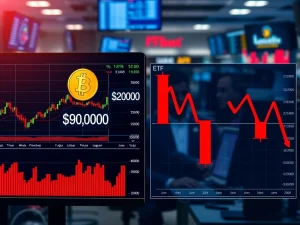Bitcoin News Today: BlackRock’s Pivotal Role in Driving Institutional Bitcoin Adoption Amid De-Dollarization

Are you ready for a seismic shift in global finance? Recent Bitcoin News Today highlights a fascinating development: BlackRock, the world’s largest asset manager with a staggering $12.5 trillion under management, is spotlighting de-dollarization as a major catalyst for burgeoning Institutional Bitcoin interest. This isn’t just another crypto headline; it signals a profound re-evaluation of global reserve strategies and asset diversification. Let’s dive into how this global trend is reshaping the future of finance and solidifying Bitcoin’s place in institutional portfolios.
Bitcoin News Today: BlackRock’s De-Dollarization Play
BlackRock’s latest analysis reveals a clear and accelerating global trend: central banks are actively seeking alternatives to the U.S. dollar. This movement, often termed De-dollarization, stems from growing concerns over the dollar’s long-term stability, influenced by factors like persistent inflation, escalating national debt levels, and evolving geopolitical landscapes. In this shifting financial paradigm, BlackRock identifies Bitcoin as a strategic asset for diversification.
Historically, gold has been the go-to hedge against currency risks. However, BlackRock’s insights suggest that cryptocurrencies, particularly Bitcoin, are increasingly being considered alongside gold. This indicates a broader acceptance of digital assets as legitimate tools to mitigate risks associated with traditional fiat currencies. The firm’s perspective aligns with observations across global markets where weakening fiat currencies and mounting national debts are prompting a reevaluation of what truly constitutes a safe-haven asset.
Why is De-Dollarization Driving Institutional Bitcoin Adoption?
The push for De-dollarization is not merely theoretical; it’s a tangible response from non-U.S. jurisdictions to recalibrate their financial systems. Central banks are experimenting with allocating reserves to non-traditional assets, moving beyond the conventional dollar-centric approach. This strategic shift is driven by several key factors:
- Inflation Concerns: Central banks are wary of the long-term inflationary pressures on the U.S. dollar, seeking assets that can better preserve purchasing power.
- High Debt Levels: The unprecedented levels of U.S. national debt raise questions about future fiscal stability, prompting diversification.
- Geopolitical Shifts: A multipolar world order is emerging, leading nations to reduce reliance on any single reserve currency for geopolitical autonomy.
- Search for Autonomy: Countries are increasingly prioritizing financial independence and control over their reserves, reducing vulnerability to U.S. monetary policy.
This environment naturally creates fertile ground for Institutional Bitcoin adoption. As traditional assets face scrutiny, Bitcoin offers a decentralized, borderless alternative, appealing to institutions focused on long-term stability and risk management.
BlackRock Bitcoin Strategy: A New Era for Crypto Diversification?
BlackRock’s embrace of Bitcoin within the de-dollarization narrative is significant, signaling a new era for Crypto Diversification. Industry leaders echo this sentiment. Kristof Gleich, President and Chief Investment Officer at Harbor Capital, emphasizes that institutional buyers are prioritizing diversification over mere price sensitivity. He notes that both gold and other alternative assets are benefiting from this strategic shift.
On platforms like Binance Square, market participants have consistently highlighted Bitcoin’s role as a robust hedge against fiat instability, especially in regions plagued by volatile currencies or severe debt burdens. This grassroots sentiment aligns with BlackRock’s top-down analysis, reinforcing Bitcoin’s growing utility as a store of value.
While legislative efforts, such as hypothetical acts aimed at reinforcing dollar-based financial infrastructure, might emerge, BlackRock suggests such measures may struggle to reverse structural global shifts. Institutional investors are increasingly valuing autonomy and broader diversification, which inherently challenges the dollar’s long-standing dominance in global reserves. This perspective underscores why BlackRock Bitcoin initiatives are so impactful.
Navigating the Institutional Bitcoin Landscape
The market has already begun to reflect Bitcoin’s growing institutional traction. Recent price movements and options trading activity have identified key resistance levels, with some analysts pointing to speculative targets around $120,000. It’s crucial to remember that such price targets are speculative and subject to significant volatility, influenced by regulatory developments and broader macroeconomic cycles.
Bloomberg’s coverage of advisor strategies often highlights the cautious yet increasingly positive approach many financial professionals are taking towards integrating digital assets into client portfolios. The dialogue has shifted from ‘if’ Bitcoin will be adopted to ‘how’ it will be integrated responsibly into diversified strategies. This evolution is a direct result of firms like BlackRock validating Bitcoin’s role in a complex global financial system.
Understanding these dynamics is key for anyone tracking Bitcoin News Today. The narrative around Bitcoin is no longer just about retail speculation; it’s about sophisticated institutional players seeking strategic advantages in a rapidly changing world.
The Future of Crypto Diversification in a Changing Global Economy
By framing Bitcoin as a vital tool for managing currency risk within a de-dollarizing global landscape, BlackRock is aligning with a new generation of investors and financial architects. This approach not only challenges conventional views of digital assets but also signals a broader acceptance of their essential role in sophisticated portfolio construction.
As central banks refine their reserve strategies and global trade dynamics continue to evolve, the intricate interplay between De-dollarization and Institutional Bitcoin adoption is poised to remain a central focus. The move towards Crypto Diversification is not a fleeting trend but a fundamental recalibration of global financial power, with Bitcoin at its core. This shift promises to reshape how nations and institutions safeguard their wealth and navigate the complexities of an interconnected world.
Frequently Asked Questions (FAQs)
1. What is de-dollarization and why is it significant for Bitcoin?
De-dollarization is the global trend of countries reducing their reliance on the U.S. dollar as a reserve currency or for international trade. It’s significant for Bitcoin because it creates a demand for alternative, independent assets. As nations diversify away from the dollar, Bitcoin’s decentralized nature and limited supply make it an attractive option for hedging against currency instability and geopolitical risks.
2. How is BlackRock influencing institutional interest in Bitcoin?
As the world’s largest asset manager, BlackRock’s public recognition of Bitcoin’s role in de-dollarization lends immense credibility to the cryptocurrency. Their analysis validates Bitcoin as a strategic diversification tool, encouraging other institutional investors and central banks to consider or increase their exposure to digital assets, thereby driving broader institutional adoption.
3. What are the main drivers for central banks to diversify away from the U.S. dollar?
Central banks are diversifying due to concerns over U.S. dollar stability, driven by factors such as high inflation, increasing U.S. national debt levels, and shifting geopolitical dynamics. They seek to reduce their vulnerability to U.S. monetary policy and achieve greater financial autonomy.
4. Is Bitcoin considered a safe-haven asset like gold?
Increasingly, yes. BlackRock’s analysis, alongside other industry voices, suggests that Bitcoin is emerging as a digital alternative to gold as a hedge against currency risks and economic uncertainty. While it still carries more volatility than gold, its characteristics like scarcity and decentralization appeal to investors seeking protection against fiat currency debasement.
5. What are the potential challenges to Bitcoin’s institutional adoption?
Despite growing interest, challenges remain, including regulatory uncertainties, market volatility, scalability concerns, and the need for robust institutional-grade infrastructure for custody and trading. Geopolitical tensions and legislative efforts to reinforce traditional financial systems could also pose hurdles, though BlackRock suggests these may struggle to reverse structural shifts.
6. How do geopolitical factors impact Bitcoin’s role in global finance?
Geopolitical tensions accelerate the de-dollarization trend as countries seek to reduce their economic reliance on potential adversaries or unstable regions. This pushes nations to explore independent financial instruments, enhancing Bitcoin’s appeal as a neutral, global, and censorship-resistant asset that can circumvent traditional financial systems impacted by political conflicts.










